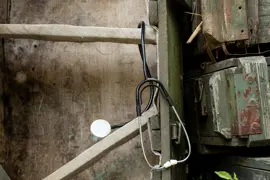
Caring under fire
The attack of healthcare workers and institutions in war zones remains the scourge of the international community while the BMA continues to push for medical neutrality to be respected. By Tim Tonkin
This month sees the world remember 80 years since the end of the Second World War, a conflict which changed the world forever and which was unequivocally the deadliest in human history.
Today is also World Humanitarian Day, an event that seeks to commemorate all those who have been injured or lost their lives in pursuit of providing healthcare and relief aid to those in conflict zones.
Sadly, violence against healthcare workers is not something that has been confined to the pages of history but can increasingly be found instead plastered across front pages and on daily news bulletins.
Despite long-established international legal precedents enshrining the neutrality of medical staff during times of war, healthcare professionals and humanitarian volunteers are increasingly finding themselves targeted in conflicts around the world.
Figures obtained by the SHCC (Safeguarding Health in Conflict Coalition) conclude that assaults directed at healthcare facilities and staff within conflict zones ‘has reached new levels of horror’, after documenting a record number of attacks in 2024.
Growing impunity
Of a total of 3,623 reported incidents, this figure itself represents a 15 per cent increase from 2023 and a 62 per cent rise on 2022, the SHCC identified 1,111 occasions where health facilities were damaged or destroyed and a total of 927 health workers having been killed.
While attacks directed against healthcare services occur throughout the world, the recent surge appears to have been largely driven by conflicts in Gaza, Ukraine, Myanmar and Sudan.
To this end figures published by the World Health Organization found that, in Ukraine alone between February 2022 and August 2024, there were 1,940 attacks by Russian forces targeting healthcare, with 86 per cent of these attacks being directed against healthcare facilities.
The month of July saw the BMA publish Medicine under attack – a report which examines the rising tide of violence against healthcare worldwide and the growing sense of impunity for those perpetrating it. It analyses attacks on humanitarian aid, facilities, transport, patients and, of course, medical personnel themselves.
It says: ‘In recent years the protections afforded to healthcare workers, laid out in international law, have been undermined and ignored outright.
‘Doctors, nurses, ambulance workers, and other medical personnel have become legitimate targets in the eyes of so many warring parties.
‘There has been a failure, both morally and practically, to protect them; dangerous hate speech coupled with obfuscation and disinformation have become the allies of forces contemptuous of humanitarian law, who believe they will not be brought to justice.’
I think we only have to open our eyes to what's happening in the world to realise that governments are distorting international humanitarian law
Andrew Green
The erosion of medical neutrality and what it means for healthcare services, those delivering them and those who depend on them, was the focus of a discussion between BMA medical ethics committee chair Andrew Green and international committee chair Kitty Mohan in a recent episode of The Doctor podcast.
‘I think we only have to open our eyes to what's happening in the world to realise that governments are distorting international humanitarian law [and are] disregarding the bits that they want to disregard,’ warns Dr Green.
‘In the long run, that’s to everybody's detriment, not just doctors and nurses and healthcare workers, but populations.
‘If hospitals aren’t a place of safety, where do you go to have your baby? Where do you go if you have your stroke? Where do you go with a heart attack?’
Compiled by the association’s ethics team, Medicine under attack warns that, unless the legal provisions protecting medical neutrality – the principle which states that doctors must be protected and free to practise medicine unimpeded within war zones – can be enforced, the consequences for medical staff and patients could be catastrophic.
Speaking to The Doctor podcast, Dr Green referred to one particularly harrowing personal account from a nurse in Sudan who survived an attack by armed forces while attempting to assist in the delivery of a baby.
‘At the very start of the procedure, the doors burst open. Gunmen came in, she was hit on the head [and] she remembers nothing else,’ Dr Green stated.
‘When she woke up, the patient was dead, the baby was dead, her surgeons were dead, and she has no memory of what happened to her in all that intervening time.’
While the immediate consequences of medical personnel being targeted by warring parties can be immediately and devastatingly apparent, such attacks can also have far-reaching and long-term detrimental effects on healthcare services.
One such effect is a reduction in access to healthcare services for those caught up in conflict zones, with medical facilities being destroyed or otherwise rendered inoperable and personnel being killed or being forced to flee.
Workers flee
The report notes that this effect has been observed in Myanmar which, since a military coup there in 2021, has seen more than 70 per cent of the country’s healthcare workers flee abroad.
The knowledge that healthcare facilities such as hospitals might be regarded as legitimate military targets may also dissuade patients in need of care from attending in the first place, further exacerbating negative health outcomes.
‘It’s known that in areas like Ethiopia and in the Democratic Republic of Congo that people do in fact avoid hospitals because they’re not seen to be a safe place,’ Dr Mohan told The Doctor podcast.
‘People may be wanting to discharge early to get back to their home so that they’re not there when there are attacks on healthcare.’
With truth commonly regarded as the first casualty in any war, Dr Mohan also warned that the deliberate targeting and killing of medical staff can serve to limit or distort wider understanding of what is happening on the ground.
‘We [also] see in conflicts that doctors, and other healthcare professionals receive the stories of individuals and communities of the conflict, [making them] a really useful and reliable source of information and evidence as to what’s going,’ she says.
‘By killing doctors and healthcare workers, we’re losing that story of the conflict already.’
People may be wanting to discharge early to get back to their home so that they’re not there when there are attacks on healthcare
Kitty Mohan
The BMA has long-established national policy defending the principle of medical neutrality and pressing for the enforcement of international human rights law, something which at present requires the co-operation of the individual nations who adhere to such legislation.
At this year’s BMA annual representative meeting, the association endorsed calls condemning the killing of healthcare staff and destruction of hospitals in Gaza as violations of international law, and for the UK Government to support international efforts to prosecute those responsible for war crimes.
Medicine under attack builds upon existing policy recommending that supranational organisations adapt to respond to the growing epidemic of medical neutrality violations.
These include the UN establishing a Special Rapporteur on the protection of health in armed conflict, and for the World Medical Association to continue to express solidarity and use its voice to raise awareness of the abuses faced by medical staff.
‘I think they [governments] really do need to reprioritise, international humanitarian law in order to protect citizens’ human rights,’ Dr Green explains.
‘They need to allow the International Criminal Court to do its job. I believe that in all the history of the ICC, there's only been one case where prosecution was made for an attack on healthcare facility, and when we have thousands of attacks in one year, that simply is not good enough.
‘[When] you’ve got, states like the United States sanctioning ICC workers rather than helping [that institution] do its job, that’s another reason, I think, why these attacks continue.’
To hear Dr Mohan and Dr Green’s conversation in full please listen to the episode eight of The Doctor podcast 'Caring under fire'




